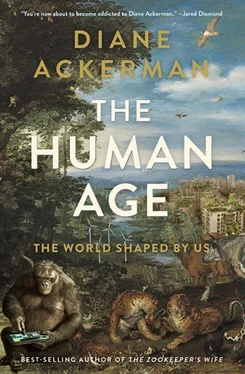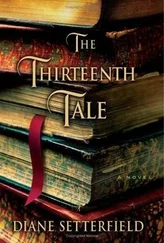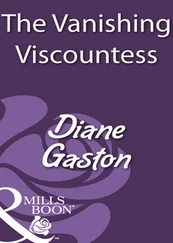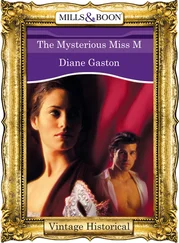Matt believes in giving the orangs as much volition as possible, and lots of mental and sensory stimulation (or privacy if they wish).
“We make almost all their choices for them, and an intelligent animal should have opportunities to make more choices themselves,” Matt says, “from deciding on the type of food they want that day to what activities they’d like to do.”
“They didn’t choose to be ambassadors for their ill-fated species,” I think aloud, wondering if future geologists will discover that we allowed orangutans to go extinct in our age, or if we were able to rescue them at the eleventh hour.
“No.” His face clouds over.
“The situation in the wild is very bad, I gather.”
“The last I’ve heard,” he says sadly, “is that the population is segmented, and right now none of the Sumatran orangutan populations are sustainable in the long term, unless we can create corridors and protect those areas. There are so many benefits to orangutan corridors—they handle the storm water, they prevent erosion, they produce oxygen, they provide places for orangutans to live. The owners don’t want orangutans near their palm plantations, but if there were functioning corridors, there would be less animal–human conflict.”
So there’s an Orangutan Awareness program at the Toronto Zoo, with education, outreach, and fund-raising for global orangutan projects. And there’s the signature Apps for Apes program (at twelve zoos thus far) reminding people how much we have in common with the other great apes. When we see an orangutan at his iPad we naturally think, He could be my son, my brother, myself .
Budi touches a game on his iPad and the screen becomes an extravaganza of flurrying creatures, alive and finning, bubbling and whirling, in an underwater prehistoric world that Budi will never see. Nor will we, for we only know them at a standstill, as uninhabited bones, relics of a previous age as dramatic as our own.
I’m wearing a fossil trilobite pendant around my neck right now. Black with prominent ribs in a silver bevel, it resembles a wood louse, and I wonder if it could rolypoly itself and somersault as wood lice do. Mostly, I wonder what its compound eyes saw so long ago. My trilobite is only an inch long, but I’ve held one nearly two feet wide in a neighbor’s private collection, its ribs a xylophone impressive enough to play a tune upon. Trilobites are uncanny instruments of life.
Millennia before the Pliocene’s celebration of the spine, when grazing quadrupeds roamed, silver birch leaves flickered like tiny salmon, and grebes first hinted at lunacy, trillions of trilobites prowled the ocean floors and paddled mud banks ajell with bacterial slime. In the evolutionary arms race, they grew armor plates, jointed legs, tough, chitinous jaws—anything to beat extinction’s warrant. When they died, they bedded the muzzy swamplands. Today human bone-tumblers ogle their chalky remains, their exquisite herringbone shells. Trying to understand their habits, we sometimes allude to their cousins, the crab, spider, and millipede, and say “adaptive radiation about a common theme.” As if that explained the papery organs within, or all the crises that fed their opportunity.
The most successful water animal ever embalmed as fossil, trilobites kept refining and upgrading themselves, over three hundred million years, until around twenty thousand different species freewheeled through deep and shallow seas on what must have seemed a trilobite-smitten planet. Some worked as stealthy ocean predators and scavengers, others as mild-mannered plankton-grazers, and still others fell into cahoots with sulfur-eating bacteria. Some developed protruding antlers and crackerjack spines. They scanned their realm with some of the oldest eyes on record, bug-eyed peepers with many lenses that weren’t organic but mineral, made of six-sided crystal calcium prisms. These radically different eyes didn’t provide crisp images but did offer a very wide field of view and motion. When a mass extinction wiped out trilobites 260 million years ago, their ancient lineage yielded to our world of insects with multifaceted eyes. But in their heyday, trilobites trolled the water world, and when they died their calcium carcasses fell to the bottom, crystal eyes and all, where layer upon layer of sediment enshrined them, gluing and compacting their bones with bits of coral and other calcium-cored creatures. Then time stacked its heavy volumes upon them, squeezing out the excess water and leaving behind limestone laced with skeletal remains. Today we use raw limestone in our roads, and grind it for paints and toothpastes—which means we use ancient trilobites, coral, and other fossils to help scrub our mouths.
That’s also what it would take to fossilize humans—not as populous as trilobites but the most successful land animal ever. Just as well. I don’t know how I’d feel brushing my teeth with the remains of ancient in-laws, or outlaws.
DRIVING DOWN THE highway that skirts Lake Cayuga, between glacial chunks of rock, I pass the uncanny work of erosion, a great sculptor of landscapes. Geologic eras are piled one on top of the other like Berber rugs, trilobites and other fossils bear witness to the evolution of life, and a host of creeks and waterfalls fume into the deep, gray-blue lake a thousand feet below. The wide ribbons of gunmetal gray and black shale I pass came from low-oxygen mud. Once this region was a shallow tropical sea that, as it evaporated, left not only mud full of marine-life skeletons that hardened into limestone but salt deposits, some of the deepest in the world. Colliding continents, 250 million years ago, stressed some of the rocks until fractures formed, land lifted, sea levels rose and fell. It’s easy to forget, when you look out over the rolling hills, that you’re seeing what once was the bottom of a sea, not the top of a mountain.
By the time dinosaurs appeared, 240 million years ago, the seas had retreated, leaving dry land, where dinosaurs stomped their footprints. When the ice age arrived, only 2 million years ago, it spread vast sheets of ice that repeatedly charged forward and dragged back, in the process gouging the deep Finger Lakes while streams cut the gorges of upstate New York. Sometimes large fossils appear from that era, like the mastodon (a hulking relative of the elephant with exceptionally long tusks) that a bemused local farmer found in his field several years ago.
Most of the life forms that once inhabited the planet have vanished, leaving no trace behind. Their remains have been polished down by the elements and bulldozed by the slow-motion avalanche of the glaciers. But geologists like Cornell University’s Terry Jordan can read a tale in the rock strata, the Earth’s dialect of stone, including the chevrons that tell of some sea-tossing event, maybe a hurricane like Sandy or Haiyan.
I like Terry Jordan from the first moment we meet in her office beside one of the sinuous plummeting gorges that are a hallmark of this lake district, a place for the geologically curious, loaded with fossils. It’s her blue argyle socks—the crisscrossing design echoes the angles one sometimes sees in rock creased by spells of turmoil, the shadow of a buckling or churning calamity so long ago that we can only date it to within tens of thousands of years.
Specializing in sediment, the earth scruff that remains long enough to petrify into pinnacles and mutate into mesas, she’s taught geology for much of a human lifetime. That seems long to me, but in her view of the past it’s only a speck.
“Does it ever feel strange thinking in such long, slow units of time, when today’s world is all about speed?” I ask.
Shaking her head with a laugh, she says, “No, I’m amazed by people who don’t think this way. How can they not see it?”
Читать дальше












